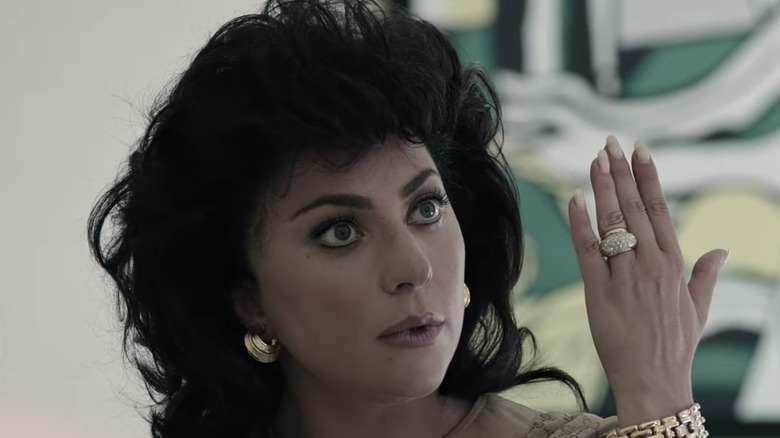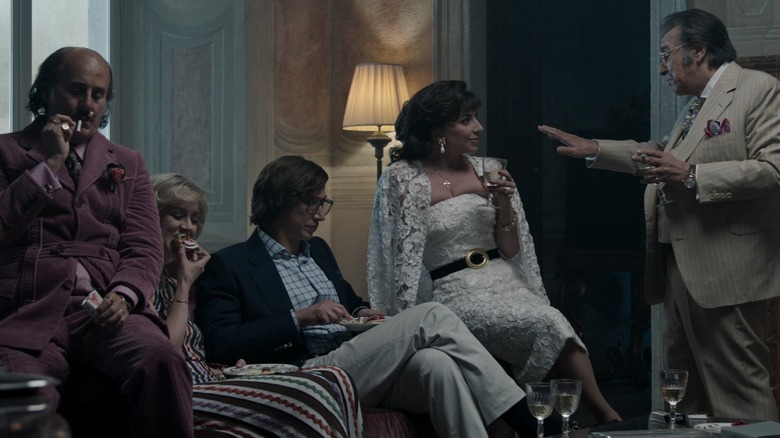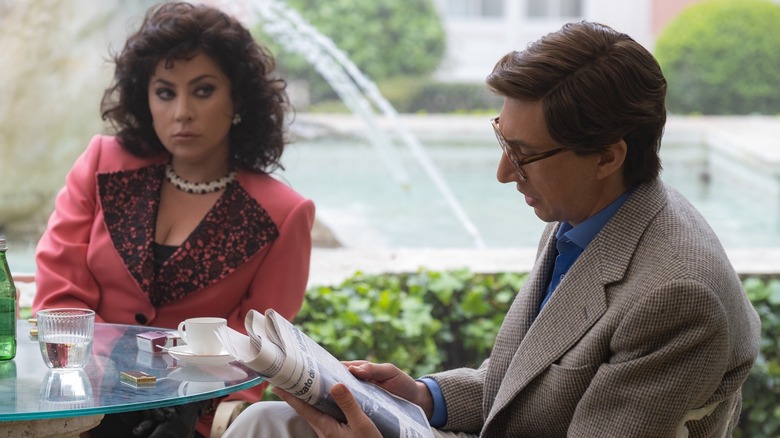House Of Gucci Review: Catastrophic Couture
No two characters in Ridley Scott's new film "House of Gucci" speak as if they're from the same country, much less the same realm of being, with their wildly divergent interpretations of the Italian accent artfully beating "Spider-Man: No Way Home" to the holiday season multiversal punch. The film, Scott's second of the year after last month's "The Last Duel," proves to be one of his messiest, most unhinged efforts in decades. But all of its flaws, questionable acting decisions, and gaudy excess come together to form one of the most entertaining and enchanting movies of the year, a prestige picture that possesses more in common with reality TV like "Real Housewives" or the soap operatics of a "Dynasty" episode.
Not unlike Scott's 2017 "All The Money in the World," his last epic about the world of the affluent and the unique scandals they experience, "House of Gucci" is based on a book telling the true story of Patrizia Reggiani (Lady Gaga), a woman who married into the Gucci family, stewards of a globally recognized fashion titan, only to have her former husband Maurizio Gucci (Adam Driver) killed for the transgression of divorcing her from the fortune she felt was rightfully hers. But Scott eschews the solemn, drab tone he reserved for the Gettys in lieu of an electric, inspired aesthetic that breezes the film's near three-hour runtime by on bold visuals, brash needle drops, and truly bombastic performances. It's a brassy true crime story told like a darkly comic melodrama, flitting back and forth between haunting tragedy and hilarious bits of comedic relief.
The film is held back from true greatness by some late pacing issues, largely the fault of an inconsistent focus and its densely packed screenplay running out of fumes the closer its decades-spanning narrative gets to its inevitable climax. But those faults don't harm the otherwise engrossing experience.
Kitsch? Camp? Who cares? It's a ball.
Nobody wins when the family feuds
At the heart of "House of Gucci," there's a tortured love story the film gets the viewer earnestly invested in, even if knowledge of historical fact and knowledge of the nature of greed mean this pairing is doomed from the start. Patrizia (Gaga), at first sight, is not a poor girl, or someone who must live without. She works in an office for her father's trucking company. She wears many form-fitting, stylish garments. She resembles a young Elizabeth Taylor, whose megawatt charisma just so happens to come with an ambitious hunger that has laid dormant until her unplanned meet-cute with Maurizio (Driver) at a party.
It is the very nature of living in a capitalist society to want more than we have. Everyone would love to be rich, famous and powerful, but they're easy desires to lay aside in regular daily life, where such aspirations feel like little more than pipe dreams. But for Patrizia, a gorgeous and cunning woman, to happen upon a handsome, unassuming bachelor who just happens to be the heir to the Gucci family fortune, this feels like a sign. She courts him aggressively, even to the point that his father Rodolfo (Jeremy Irons) insists she is little more than a gold digger. But Maurizio is attracted to all the things about her that keep her from fitting in with his family. He has seen the ruthless machinations of the greedy and wants to live a life as removed from it as possible, and preferably with Patrizia.
But even if Patrizia does love Maurizio for who he is as a person, the true lure is seeing him as a moldable man, someone she can trim and shave into the shape of a key to unlock her wildest dreams, the bottomless glut of material desire that leads her to a friendship with a television psychic (Salma Hayek). Rodolfo writes Maurizio out of the will for marrying Patrizia, so he begins to work for his new father-in-law and finds himself happier than he's ever been. But if Patrizia wanted to marry a man who worked for a trucking company, she would have gotten a ring from any number of her father's employees. No, she was after a Gucci.
So the movie truly gets going when Patrizia takes matters into her own hands, manipulating the Gucci family turn by turn. First, she goes to work on her new uncle Aldo (Al Pacino), the business half of the Gucci empire who wants to cut his brother out and franchise their brand in any way possible. Then she brokers peace between Maurizio and Rudolfo. And when it becomes clear that Aldo will not let control of the brand be wrested from him with ease, she weaponizes his idiot son Paolo (Jared Leto) to further tear the family apart, even if it means involving the feds to do so.
It is in a complicated morass of tax fraud charges, blood betrayal and exponential expenditures piling mountain high that Maurizio finally sees his father's truth, that proximity to wealth will turn even the poorest soul as wretched as the rich cretins he calls his kin. The only thing more impressive in this film than the fire Driver and Gaga illuminate in their onscreen attraction to one another is the sudden ache when it's so rapidly snuffed out.
What's better than one billionaire?
But that's where "House of Gucci" begins to stumble. Up to the moment Maurizio begins the necessary plans to extricate Patrizia from his daily life, now having seen how wrong he's always been about her, Gaga's gravitational pull drives the film's momentum. Her Patrizia is such a force onscreen. Though she has all the trappings of a melodramatic heel, Gaga plays her with enough empathy that she never feels like a bargain bin femme fatale. Even when she's dead wrong or literally tearing this family apart for personal gain, we want to side with her because she's singularly hypnotic and alluring — and the film makes it clear that the dunderheaded Guccis have amassed their largesse through the same unscrupulous means she has. Fair is fair.
Late in the film, the focus shifts to Maurizio, whom Driver makes quite compelling. Maurizio's arc, however, feels like it comes from an altogether different movie. In Patrizia's absence, he himself becomes as enamored by the wealth and cultural cache he previously spent his life running from, and when he recognizes that very same hunger within himself that led him to abandon his wife, he has an epiphany of sorts. It just comes too late, with his tragic fate already sealed.
This is only an issue because it takes the dialed-to-11 histrionics and self-indulgent thrills the rest of the cast provide and scoots them to the side for a short story excursion that can't match what precedes it in verve or entertainment value. That this shift comes at exactly the point in the film's bloated runtime that patrons may begin checking their watches is no help, either.
"House of Gucci" soars when Scott lets its themes resonate on the back burner of the mind's eye. The viewer can get so swept up in the drama of it all, the messy têtes-à-tête between backstabbing millionaires in gorgeous costumes, set to show-stopping, period-appropriate pop songs, with scenery-chewing shade thrown at all times. They don't have time to worry about any factual inaccuracies in the narrative (of which there are many) or to question too deeply whether making a movie this funny about someone's murder is really in good taste.
It doesn't matter that Gaga sounds Russian half the time, or that Pacino and Leto are re-enacting the Michael/Fredo arc from "The Godfather: Part II" if those roles were played by Wario and Waluigi, respectively. It's a daring, devil-may-care approach to a story that could easily have wound up a self-serious awards-bait outing when what it really calls for is a bit of the Ryan Murphy magic that has made similar tales function so well in the television space.
"House of Gucci," like the high-end fashion it often displays, is all the more charming for its flaws and questionable creative decisions.


